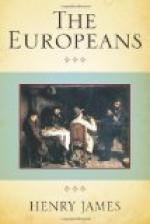One day—it was late in the afternoon—Acton pulled up his horses on the crest of a hill which commanded a beautiful prospect. He let them stand a long time to rest, while he sat there and talked with Madame M; auunster. The prospect was beautiful in spite of there being nothing human within sight. There was a wilderness of woods, and the gleam of a distant river, and a glimpse of half the hill-tops in Massachusetts. The road had a wide, grassy margin, on the further side of which there flowed a deep, clear brook; there were wild flowers in the grass, and beside the brook lay the trunk of a fallen tree. Acton waited a while; at last a rustic wayfarer came trudging along the road. Acton asked him to hold the horses—a service he consented to render, as a friendly turn to a fellow-citizen. Then he invited the Baroness to descend, and the two wandered away, across the grass, and sat down on the log beside the brook.
“I imagine it does n’t remind you of Silberstadt,” said Acton. It was the first time that he had mentioned Silberstadt to her, for particular reasons. He knew she had a husband there, and this was disagreeable to him; and, furthermore, it had been repeated to him that this husband wished to put her away—a state of affairs to which even indirect reference was to be deprecated. It was true, nevertheless, that the Baroness herself had often alluded to Silberstadt; and Acton had often wondered why her husband wished to get rid of her. It was a curious position for a lady—this being known as a repudiated wife; and it is worthy of observation that the Baroness carried it off with exceeding grace and dignity. She had made it felt, from the first, that there were two sides to the question, and that her own side, when she should choose to present it, would be replete with touching interest.
“It does not remind me of the town, of course,” she said, “of the sculptured gables and the Gothic churches, of the wonderful Schloss, with its moat and its clustering towers. But it has a little look of some other parts of the principality. One might fancy one’s self among those grand old German forests, those legendary mountains; the sort of country one sees from the windows at Shreckenstein.”
“What is Shreckenstein?” asked Acton.
“It is a great castle,—the summer residence of the Reigning Prince.”
“Have you ever lived there?”
“I have stayed there,” said the Baroness. Acton was silent; he looked a while at the uncastled landscape before him. “It is the first time you have ever asked me about Silberstadt,” she said. “I should think you would want to know about my marriage; it must seem to you very strange.”
Acton looked at her a moment. “Now you would n’t like me to say that!”
“You Americans have such odd ways!” the Baroness declared. “You never ask anything outright; there seem to be so many things you can’t talk about.”
“We Americans are very polite,” said Acton, whose national consciousness had been complicated by a residence in foreign lands, and who yet disliked to hear Americans abused. “We don’t like to tread upon people’s toes,” he said. “But I should like very much to hear about your marriage. Now tell me how it came about.”




